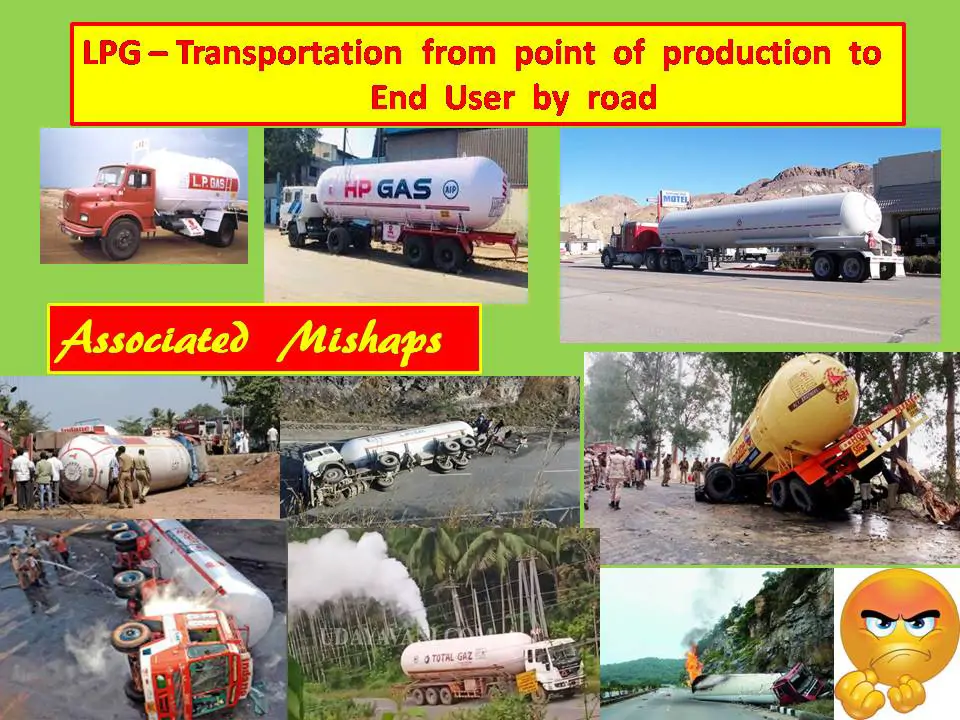
Safety during transporting bulk LPG by road - SMPV rules

Ashok Khopkar
Consultant
$ 20
1 already enrolled!
Beginner course for learners
Foundational Learning
Access to Study Materials
Self-Paced Learning

Safety during transporting bulk LPG by road - SMPV rules
Trainers feedback
4
(12 reviews)
Ashok Khopkar
Consultant
Course type
Instructor led live training
Course duration
2 Hrs
Course start date & time
Coming in Next Month
Language
English
This course format is where trainer will explain you the subject via online live session. Date and time are not decided yet but it will be planned within next 2 weeks after you enroll & pay for this course()?. Get in touch with our team if any clarification is required.
Why enroll
What will you learn...What benefits you will get ..
1. Better understanding and improved clarity about rules related to LPG transport
2. Clarity about intention of providing various safety features and underlying principles.
3. This, in turn, will result in your working more confidently on your job or in your business
4. Enhance personal safety, improved safety record, especially for operating personnel
4. This will bring you more responsibility in job, higher position in company organisation, better remuneration package, stability in job.
5. In business, you will be more convincing to your clients, bringing more business and better quality execution.
Opportunities that awaits you!

Earn a course completion certificate
Add this credential to your LinkedIn profile, resume, or CV. Share it on social media and in your performance review
Course details
Objective ...
Increase awareness about importance of safety features and rules related to LPG road transport, consequences if not implemented properly and safe practices
About the course ...
For inland transportation of LPG in bulk, road transport is the most convenient "Last mile coverage" method. Hence, thousands of Tank Trucks (TT) - (Road tankers) are criss-crossing the roads all over the world. Same is the picture in India. Highways, small town roads, hilly areas, ghats, forests, hot and cold regions .... You will see them everywhere. Public sector OMCs and Hundreds of private transport companies own these TT. Thousands of truck operators and their assistants earn their bread and butter doing this job. Many times, they travel in night and take rest in the day, depending on ambient temperatures.
Though statistics showing how many TT are being operated in India currently, could not be found, according to one website, during 2013 to 2018,in India, Govt OMCs hired services of 19000 TT, and 24000 TT during 2019 to 2023.
LPG being highly inflammable, every TT is a travelling bomb, capable of creating hazardous situation in few kilometers area surrounding that spot. Though we often hear news about accidents involving TT or tanker carrying other hazardous fluid, the number is small percentage of the number TTs on the road.
How is this possible?
This is possible because every country has developed stringent rules and regulations for controlling the activities related to LPG road transport, and also the strict implementation of the same. In India, PESO has assumed the role of controller, under the stewardship of Chief Controller of Explosives (CCOE). Rules with title "Static and Mobile Pressure Vessel rules (SMPV rules)" is the rulebook for this.
For anyone, working in this industry, in any capacity, at any stage from design of TT to final LPG delivery to end user, it is essential to know sufficiently, the rules; and thoroughly understand the principles involved in that particular rule. This will ensure proper implementation and enhanced safety.
This course is an effort towards acquainting the participants with the rules and more importantly, explaining the principles underlying the rule.
Who will benefit by this course ---
This course will be useful for everyone, in LPG transport business --- TT owners and their technical staff, truck operators, storage plant operation and maintenance personnel, TT designers, manufacturers.
Course suitable for
Oil & Gas Mechanical
Training details
This is a live course that has a scheduled start date.
Live session
Our Alumni Work At
Why people choose EveryEng
Industry-aligned courses, expert training, hands-on learning, recognized certifications, and job opportunities—all in a flexible and supportive environment.
- Industry Veteran
- Trainer Review

KPMG
From learning new technologies to getting hired, this platform changed engineer's career trajectory! It's a great work by Engineer's behind the EveryEng brain.

Rahul Dalal
Senior Resourc Manager
Dallas, USA

Halliburton
I had been looking for a reliable online platform for engineering courses, and EveryEng delivered beyond my expectations. The content is top-notch, the instructors are excellent, and the learning experience is seamless.

Harish Venugopal
Technical Professional
Bangalore, India

SaiDeepa
EveryEng has completely transformed the learning experience. The platform is easy to navigate, offers high-quality content, and provides great support. I highly recommend it to anyone looking to upskill in engineering.

Sunil Nukatti
CEO
Hydrabad, India

L&T
EveryEng is a game-changer in engineering education. The platform provides high-quality courses, interactive learning experiences, and excellent mentor support. It has significantly helped me grow in my engineering career.

Omkar Zolekar
Ass Manager, Projects
Mumbai, India

Lummus
I love how EveryEng makes complex engineering concepts easy to understand. The platform offers valuable insights, great mentors, and a supportive community. It's truly a one-stop solution for engineers worldwide.

Siddharth Mishra
Project Manager
Frankfrut, Germany
$ 20
- $ 0 Early bird discount
Coming in Next Month
Questions and Answers
A: IS 2062 carbon steel appears ordinary, which makes it easy to doubt under coastal service, but SMPV assumes dry LPG and manages external corrosion by coating and inspection, not exotic metallurgy. Stainless sounds attractive, yet chloride stress cracking under road salt and cost make it a poor fit. Low alloy steel adds strength, not meaningful corrosion resistance in this exposure. Epoxy linings solve liquid corrosion problems you don't actually have with dry LPG and introduce lining failure risk.
A: Excess flow valves need a high flow rate to trip, so a slow seep looks harmless to them. Hose rupture and drive-away both generate the surge the valve is meant to sense. Mechanical damage that opens the line fast enough also triggers closure. The subtle failure is the one that never reaches the set differential.
A: Solar heat on a full tanker with little vapour space drives liquid expansion fast, which is exactly the scenario SMPV fears. Vapour return issues matter during transfer, not static parking. Residual nitrogen would show up as higher starting pressure, not a slow climb. A bad gauge explains the reading, not the thermodynamic behaviour observed.
A: Fire exposure is the design basis SMPV keeps coming back to, and secondary metal sealing is what survives it. Soft seats seal well until they burn. Gate valves give indication but are slow and bulky for emergency isolation. Butterfly valves are fine elsewhere, but not as primary TT isolation under SMPV expectations.
A: Bench testing establishes set pressure without system variables, then you make sure installation doesn’t defeat it. In-situ pop testing on LPG is rarely practical or safe. Paper review alone ignores installation errors. Hydrotesting with the PSV installed risks damaging it and tells you little about set accuracy.
A: Moisture held against the shell by saddles is a classic road tanker problem. H2S cracking needs sour service conditions that aren’t present. Internal corrosion contradicts the external damage pattern. Galvanic effects exist, but without dissimilar metals the driving force is weak compared to crevice action.
A: The fusible plug sacrifices inventory to save the vessel, venting vapour when fire heats it. Isolation is done by valves, not melting plugs. Cooling is a side effect, not the mechanism. It does nothing to strengthen steel that’s already hot.
A: Marginal flow can make an excess flow valve hunt, choking itself repeatedly. Vapour lock would show pressure instability. Cavitation sits with the pump, not the tanker outlet. Composition affects density, not sudden step changes like this.
A: A verified earth path is the only controllable safeguard here. Tyres vary with wear and temperature. Bonding through the arm assumes perfect connections every time. Higher velocity increases charge generation rather than fixing it.
A: The trend tells you damage is accumulating even if the code box is ticked, and COMAH scrutiny punishes ignoring that signal. Blind acceptance hides risk. Higher pressure accelerates damage. Shorter intervals help only if paired with understanding the mechanism.
More from Same Author
- Technical Courses
- Articles
4 (12)
2230
51
Online
Live courses
February 10
1.5 Hrs
Online
Live courses
Interacting with trainer
4 (12)
1365
61
Online
Live courses
August 10
1 Hrs
Online
Live courses
Interacting with trainer
4 (12)
541
Online
Live courses
Intermediate
Online
Live courses
Interacting with trainer
Earning and Growth option in same Industry Domain
- Pre-recorded
- Online live session
- Offline
- Articles
4 (29)
2937
27
E-Learning
Unlimited access
Advanced
E-Learning
Unlimited access
Pre-recorded videos
4 (384)
1736
E-Learning
Unlimited access
Beginner
E-Learning
Unlimited access
Pre-recorded videos
1336
1
E-Learning
Unlimited access
E-Learning
Unlimited access
Pre-recorded videos
More Training & Development option to expand your reach
- Technical courses
- Soft-skills courses
- Seminars
- Articles & Blogs
4 (16)
1918
6
Online
Live courses
December 31
160 Hrs
Advanced
Online
Live courses
Interacting with trainer
4
156
Online
Live courses
February 21
25 Hrs
Advanced
Online
Live courses
Interacting with trainer
4 (16)
784
Online
Live courses
February 21
30 Hrs
Advanced
Online
Live courses
Interacting with trainer














